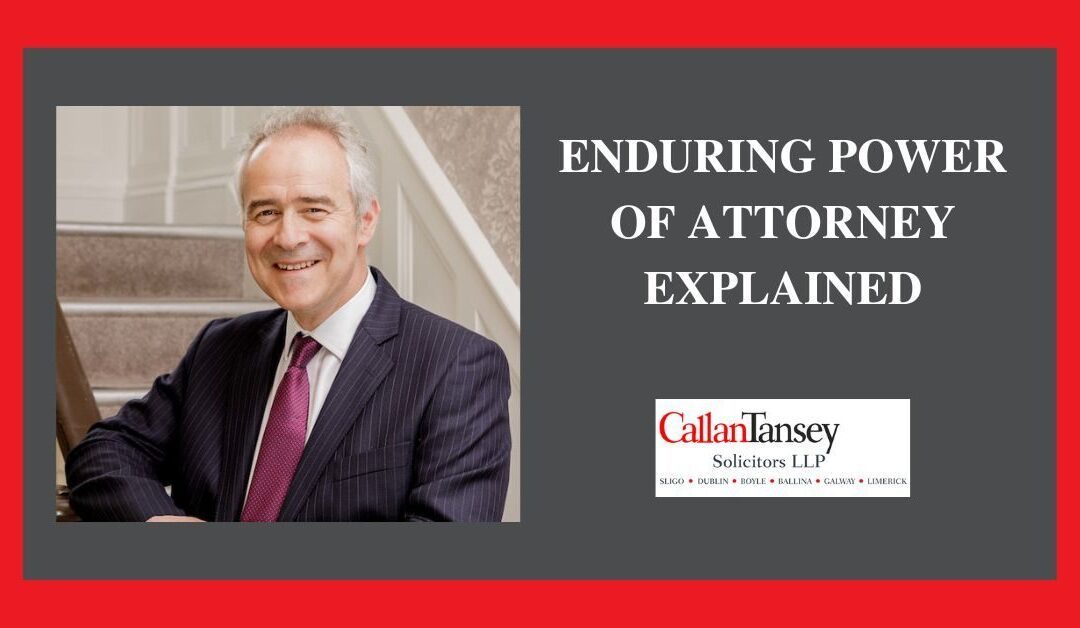Everyone knows the importance of making a Will, but have you considered making an Enduring Power of Attorney? Here Christopher Callan, Partner, outlines the advantages of having an Enduring Power of Attorney and the risks that arise if you do not.
What is an Enduring Power of Attorney?
An Enduring Power of Attorney is a document which you sign so that there are designated person(s) whom you have chosen who can handle your legal affairs if at some time in the future you do not have mental capacity. Because of the responsibilities that go with the position of being an attorney, it is better and safer to have two.
Why should I make an Enduring Power of Attorney?
To cover the eventuality that you may suffer from a stroke or brain injury which deprives you of your legal capacity. Also, dementia is a very common condition now in Ireland. As we are living longer, the likelihood of suffering from dementia or some form of cognitive impairment increases.
Many people who suffer from dementia still have the requisite legal capacity to manage their legal affairs. However, if the condition is sufficiently serious, it can deprive a person of his or her capacity in this regard. If you have an Enduring Power of Attorney, then you will have chosen the person(s) who can manage your legal affairs when you are not able to do so. If you do not have an Enduring Power of Attorney, the only option is to have you made a Ward of Court.
How do you register an Enduring Power of Attorney in Ireland?
The attorneys must obtain a medical report from a doctor (your GP or Consultant Geriatrician). this must confirm that you no longer have legal capacity. They must also serve notices on you, the notice parties whom you will have named in your Enduring Power of Attorney, and the Registrar of the Wards of Court of their intention to apply to register the Enduring Power of Attorney.
The notice parties are at least two people who you previously notified of the fact that you signed an Enduring Power of Attorney. These people would generally be other members of the family. Once this has been done, they must wait for the five week notice period to expire before proceeding with an application to the Wards of Court office (High Court) to have the Enduring Power of Attorney registered. All in all, this takes about two/three months.
When should you register an Enduring Power of Attorney?
Your attorneys should register the Enduring Power of Attorney if there are issues or tasks to be dealt with and you don’t have the requisite legal capacity to act, for example, dealing with your bank accounts, tax and financial affairs, leasing or selling property etc.
What are the benefits of registering an Enduring Power of Attorney?
Firstly, applying to register an Enduring Power of Attorney is less costly and cumbersome than having someone made a Ward of Court. Secondly, if you have an Enduring Power of Attorney you will have chosen the person(s) whom you want to look after your affairs. If you are made a Ward of Court, it may well be that the person(s) applying to the Court are not the persons whom you would have wished to be those who will act on your behalf.
What are the risks of not having an Enduring Power of Attorney?
The risk of not having an Enduring Power of Attorney is that the only other option available is Wardship.
What is the difference between Enduring and Lasting Power of Attorney?
What we call an Enduring Power of Attorney in this country is described in some other countries as a Lasting Power of Attorney.
Are there changes coming down the line?
Yes – the old system of Wardship is about to be discontinued. A New Decision Support Service will commence in its place. The requirements for Enduring Power of Attorney’s will also change. For example, once you have signed and completed your Enduring Power of Attorney, you will have to register it with the Decision Support Service. Then, if it necessary to activate the Enduring Power of Attorney, your attorneys will have to make an application to the DSS so there will be two sets of registration fees.
If you have questions about any of the issues raised in this article, or about Making a Will, you can contact Christopher Callan by email.


